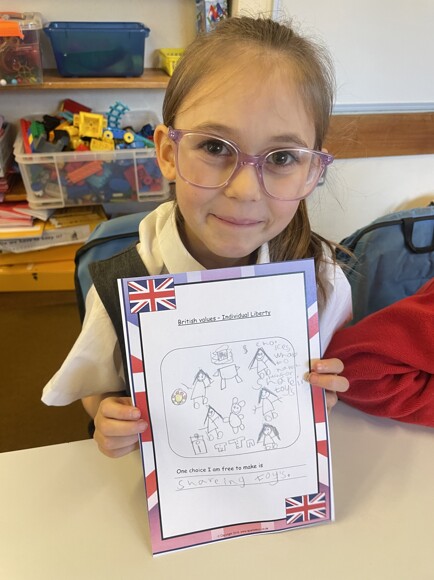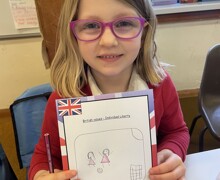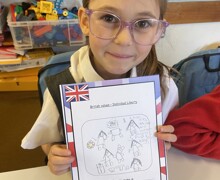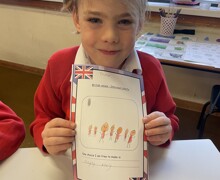- Home
- Curriculum
- British Values
- Individual Liberty
- facebook Share this page on Facebook
- twitter Tweet this page
- pinterest Pin this page
Individual Liberty
Individual Liberty is the right to make our own choices, as long as they do not impact the rights of others. Each class explored this in a meaningful way.
Click below to find out how each phase explored this important theme.
Olympus
In Reception, we place a strong emphasis on helping children develop the confidence to express their beliefs, share their opinions, and understand what makes them unique.
Celebrating Our Families and Individuality!
Families were invited to send in a photograph or talk with their child about what makes their family special. Children proudly brought in meaningful items such as trophies, favourite books, photographs and boxing medals. Each child had the opportunity to talk about what makes them unique and special, and to answer questions from their peers.
We also took part in activities that celebrate difference, such as circle games where children shared what they are good at and what makes them proud of themselves.

How do we promote Individal Liberty in Olympus Class?
Our activities promote the British value of individual liberty by helping children to:
-
Understand the world around them
-
Gain confidence in sharing their views and opinions
-
Develop an understanding of different relationships
-
Build awareness of other communities and the roles within them
-
Develop a positive sense of self
Learning Through Outdoor Play
Outdoor activities also play an important role in developing confidence, independence and self-esteem:
-
Obstacle courses – encourage children to take appropriate risks and build confidence
-
Den building – give children opportunities to make choices and work collaboratively
-
Mixing colours – help children explore feelings, responsibility and creative expression
-
Races and physical challenges – support children in developing confidence in their own abilities

O: my family are special and I love my pets. I am good at dancing.
A: I am unique! No one else has lived in Singapore apart from me and Mrs Wavish and no one else has a brother called B in my class. I am good at drawing and helping.
N: My medals are important. My brothers do boxing too and you have to be tough but you have be to be respectful. I am proud of the trophy.
E: I am learning gymnastics and good at backwards roll. It is a picture of my cats that is special to me.
Key Stage One
In our learning about British Values, we focused on Individual Liberty. Ben Hope and Ben Nevis talked to the children about having the freedom to make their own choices while also understanding the importance of following rules that help keep everyone safe.
Together, we explored different scenarios and discussed whether the choices shown were safe or unsafe, encouraging pupils to think carefully about the consequences of their actions. The children then reflected on their own day and drew examples of the choices they had made.
Pupil voice
I choose to be kind to others – Poppy
We have to make good choices to keep people safe – Othniel
I make good choices everyday like following the school rules to show respect – Zeyna-Su

Lower Key Stage Two
Kilimanjaro
Individual means our own and liberty means freedom. We learned about freedom of speech which means we can say our poinions and what we believe. We talked about the rules to make sure we use our freedom of speech appropriately. Some of us wrote the ten rules and then we wrote our freedom of speech bubbles with our opinions. (By Lilly)
Pupil Voice:
"If you have nothing nice to say, don't say it. Two wrongs don't make a right." - Oliver
"Free speech is important because it means we can't be stopped or punished just for expressing our opinions." - Kathleen
"Just because we have freedom, we can't go around being mean. We still have rules." - Louis

Snowdon
Snowdon explored the British Value of Individual Liberty, focusing on the importance of making choices, expressing opinions and understanding that everyone has the right to be heard within a respectful and safe school community.
Through discussion and shared examples, children reflected on how individual liberty looks in school life, including making positive choices, taking responsibility for actions and respecting the freedoms of others.
Pupil voice:
-
“Individual liberty means I can share my ideas and people listen to me.” Benjamin
-
“It’s about being yourself but still following the rules to keep everyone safe.” Velina
-
“We all get choices, but we have to think about how they affect other people.” Harry
Everest
In Everest Class, we played “Would You Rather…?” to explore the British value of individual liberty. The children were given a range of choices, including foods, films, clothes, books and music, and enjoyed sharing their preferences. This led to a thoughtful discussion about how individual liberty gives us the freedom to make our own choices. We also talked about the importance of ensuring that our choices are kind, respectful and considerate of others.

Upper Key Stage Two
As part of our work on British Values, pupils in UKS2 took part in a courtroom roleâplay focused on the British Value of individual liberty. The question they explored was whether the freedom to choose where they sit in class should be protected or limited. The children took on the roles of the prosecution, defence, witnesses, jury members and the judge, using evidence, questioning and clear reasoning to reach a fair verdict. Through the discussion, they considered individual liberty as an important right, while recognising that it must be balanced with the needs, safety and learning of the whole class.

Pupil Voice:
Charlie: I really enjoyed playing the role of judge, listening to both sides and making a decision. It was interesting to see how a courtroom could relate to our own lives.
Megan: I liked how we all worked together acting like we were in a courtroom, and I like how the activity was filled with teamwork, I found it interesting learning about the balance between individual liberty and having to follow rules.

Curriculum
- Behaviour - Ready Respectful Safe
- Curriculum Intent
- Home Learning - Learning with Parents
- How do we Assess?
- Inclusion
- Our Classes
- Our Curriculum
- Outdoor Learning
- Reading
- Sport and Health
- Subjects: Art and Design
- Subjects: Computing
- Subjects: Design and Technology
- Subjects: Geography
- Subjects: History
- Subjects: Maths
- Subjects: Modern Foreign Language
- Subjects: Music
- Subjects: PE
- Subjects: Religious Education
- Subjects: RSE
- Subjects: Science
- The School Library
- Thrive
- OPAL (Outdoor Play and Learning)
- Enrichment Clubs
- British Values
- Personal Development
- Year 6 Residential 2025
- Express Events
- Mental Health Support Team
- Writing












